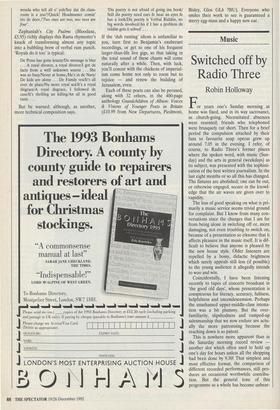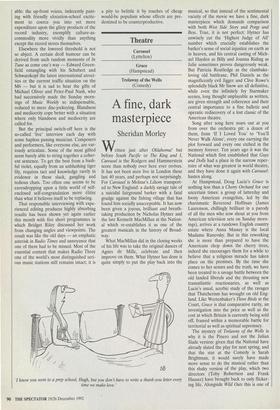Mu sic
Switched off by Radio Three
Robin Holloway
For years one's Sunday morning at home was fixed, and in its way sacrosanct, as church-going. Necessitated absences were resented; friends who telephoned were brusquely cut short. Then for a brief period the compulsion attached by their fans to favourite soap operas grew up around 7.05 in the evening. I refer, of course, to Radio Three's former places where the spoken word, with music (Sun- day) and the arts in general (weekdays) as its subject, was presented with the sophisti- cation of the best written journalism. In the last eight months or so all this has changed. The fixtures are abolished; one can be out, or otherwise engaged, secure in the knowl- edge that the air waves are given over to vapidity.
The loss of good speaking on what is pri- marily a music service seems trivial ground for complaint. But I know from many con- versations since the changes that I am far from being alone in switching off or, more damaging, not even troubling to switch on, because of a presentation so irksome that it affects pleasure in the music itself. It is dif- ficult to believe that anyone is pleased by the new house style. Older listeners are repelled by a bossy, didactic brightness which surely appeals still less (if possible) to the young audience it allegedly intends to woo and win.
Coincidentally, I have been listening recently to tapes of concerts broadcast in 'the good old days', whose presentation is conspicuous for literacy, accuracy, fullness, helpfulness and uncondescension. Perhaps the unashamed upper-middle-class intona- tion was a bit plummy. But the over- familiarity, slipshodness and vamped-up salesmanship that we now endure are actu- ally the more patronising because the reaching down is so patent.
This is nowhere more apparent than in the Saturday morning record review — another slot which often used to hold up one's day for hours unless all the shopping had been done by 9.30! That simplest and most effective format, the comparison of different recorded performances, still pro- duces an occasional worthwhile contribu- tion. But the general tone of this programme as a whole has become unbear- able: the up-front voices, indecently pant- ing with friendly elocution-school excite- ment to coerce you into yet more expenditure upon the glitzy products of the record industry, exemplify culture as commodity more vividly than anything except the record stores themselves.
Elsewhere the lowered threshold is not so abject. A certain droll humour can be derived from such random moments of In Tune as come one's way — Edward Green- field entangling with his Schubert and Schwarzkopf the latest international atroci- ties or the current traffic situation on the M6 — but it is sad to hear the gifts of Michael Oliver and Peter-Paul Nash, who had successively made the Sunday morn- ings of Music Weekly so indispensable, reduced to mere disc-jockeying. Blandness and mediocrity cope better with a situation where only blandness and mediocrity are called for.
But the principal switch-off here is the so-called 'live' interview each day with some hapless passing musician. Composers and performers, like everyone else, are var- iously articulate. Some of the most gifted seem barely able to string together a coher- ent sentence. To get the best from a bash- ful violet, equally from an unblushing tiger lily, requires tact and knowledge rarely in evidence in these slack, gangling and tedious chats. Too often one seems to be eavesdropping upon a little world of self- enclosed self-congratulation more elitist than what it believes itself to be replacing.
That responsible interviewing with expe- rienced editing produces highly absorbing results has been shown yet again earlier this month with five short programmes in which Bridget Riley discussed her work from changing angles and viewpoints. The result was like the old days — an emphatic asterisk in Radio Times and annoyance that one of them had to be missed. Most of the essential content that makes Radio Three one of the world's most distinguished seri- ous music stations still remains intact; it is a pity to belittle it by touches of cheap would-be populism whose effects are pre- destined to be counterproductive.











































































































 Previous page
Previous page